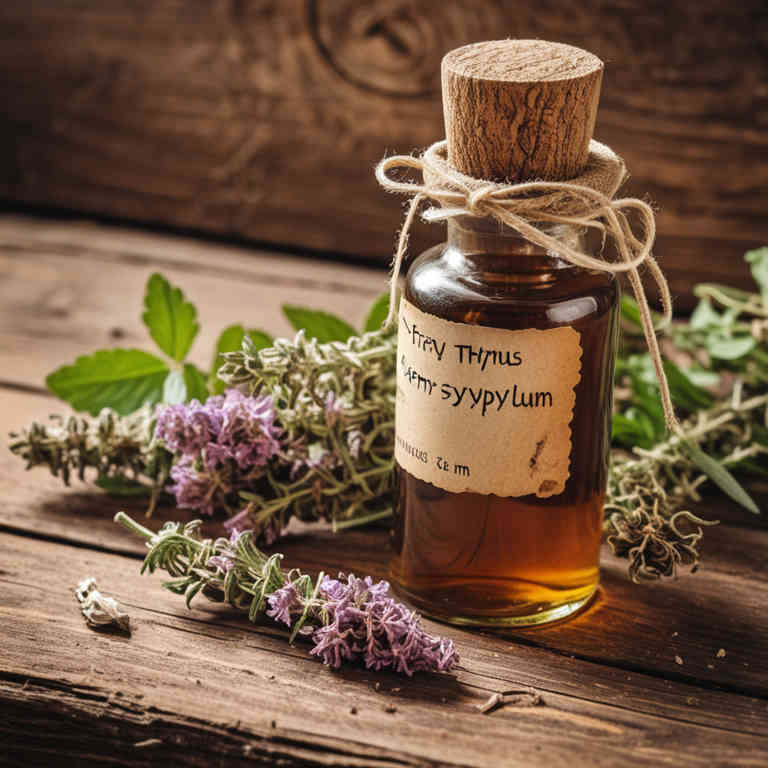Thymus serpyllum tincture for medicinal use

Thymus serpyllum tincture is a herbal preparation made from the flowering plant known as wild thyme, which is harvested and steeped in alcohol to extract its active compounds.
This tincture is valued in herbalism for its antiseptic, antimicrobial, and expectorant properties. It is commonly used to support respiratory health, helping to relieve coughs, congestion, and bronchitis. Additionally, it may aid in digestion and has been traditionally used to treat skin infections and wounds.
Its aromatic nature also makes it a popular ingredient in aromatherapy and natural remedies.
Uses
Thymus serpyllum tincture has been used to treat respiratory ailments, digestive issues, and emotional distress for centuries.
Historically, it was valued in ancient Greece and Rome for its antiseptic and calming properties, often used to treat wounds and soothe the nervous system. In traditional herbal medicine, it was also employed to alleviate symptoms of colds, coughs, and bronchitis, as well as to support digestion and relieve gas. Modern uses include its application in aromatherapy and as a natural remedy for stress, anxiety, and respiratory conditions due to its high concentration of thymol, a powerful antimicrobial compound.
Today, it is still widely used in holistic health practices for its purported ability to enhance immunity and promote overall well-being.
Benefits
Thymus serpyllum tincture has health benefits such as boosting the immune system, reducing inflammation, and supporting respiratory health.
It is often used to alleviate symptoms of colds, coughs, and bronchitis due to its expectorant and antimicrobial properties. The tincture may also help in managing stress and anxiety by promoting relaxation and improving mood. Additionally, it is believed to have antiseptic and antifungal qualities that can aid in skin healing and wound recovery.
Overall, Thymus serpyllum tincture is a versatile herbal remedy with a range of potential therapeutic uses.
Constituents
Thymus serpyllum tincture active constituents include thymol, carvacrol, and terpenoids, which are known for their potent antimicrobial and antifungal properties.
These compounds work synergistically to support immune function and combat infections by inhibiting the growth of bacteria and fungi. Thymol, in particular, is a powerful antioxidant that helps reduce oxidative stress in the body. Carvacrol contributes to the tincture's ability to soothe respiratory tract inflammation and promote expectoration.
This herbal preparation is commonly used to support respiratory health, digestive wellness, and as a natural remedy for minor infections.
Preparation
To make Thymus serpyllum tincture, first gather fresh or dried Thymus serpyllum (wild thyme) and ensure it is free from pesticides.
Next, place the herb in a clean glass jar and cover it completely with high-proof alcohol, such as vodka or grain alcohol. Seal the jar and let it sit in a dark, cool place for 4 to 6 weeks, shaking it gently every few days. After the steeping period, strain the liquid through a cheesecloth or fine mesh strainer to remove the plant material.
Finally, transfer the tincture to a dark glass bottle and store it in a cool, dry place away from direct sunlight.
Side Effects
Thymus serpyllum tincture may lead to gastrointestinal discomfort, including nausea, vomiting, and diarrhea, particularly with high doses or prolonged use.
It can also cause allergic reactions in individuals sensitive to thyme or related plants, manifesting as skin rashes, itching, or respiratory symptoms. Long-term use may disrupt the balance of gut microbiota, potentially leading to digestive issues. Some studies suggest it might interact with certain medications, such as anticoagulants, increasing the risk of bleeding.
It is important to consult a healthcare provider before use, especially for pregnant women, breastfeeding mothers, or those with chronic health conditions.